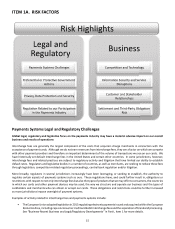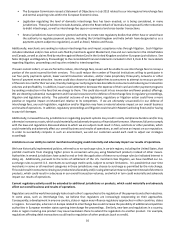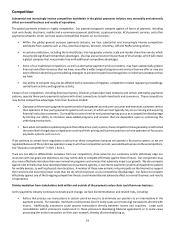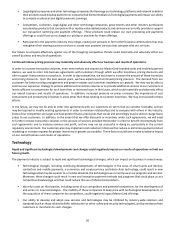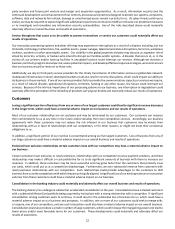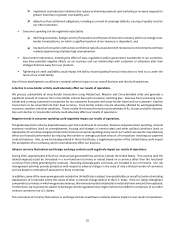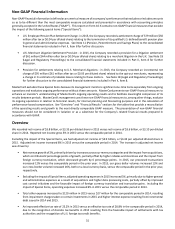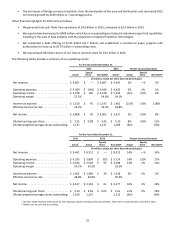MasterCard 2015 Annual Report Download - page 29
Download and view the complete annual report
Please find page 29 of the 2015 MasterCard annual report below. You can navigate through the pages in the report by either clicking on the pages listed below, or by using the keyword search tool below to find specific information within the annual report.23
Stakeholders
Our failure to maintain our relationships with issuers and acquirers may materially and adversely affect our business.
While we work directly with many stakeholders in the payments system, including merchants, governments and large digital
companies and other technology companies, we are, and will continue to be, significantly dependent on our relationships with
our issuers and acquirers and their further relationships with cardholders and merchants to support our programs and services.
We do not issue cards or other payment devices, extend credit to cardholders or determine the interest rates or other fees
charged to cardholders using our products. Each issuer determines these and most other competitive payment program features.
In addition, we do not establish the discount rate that merchants are charged for acceptance, which is the responsibility of our
acquiring customers. As a result, our business significantly depends on the continued success and competitiveness of our issuing
and acquiring customers and the strength of our relationships with them. In turn, our customers’ success depends on a variety
of factors over which we have little or no influence. If our customers become financially unstable, we may lose revenue or we
may be exposed to settlement risk. See our risk factor in “Risk Factors - Settlement Risk” in this Part I, Item 1A with respect to
how we guarantee certain third-party obligations for further discussion.
With the exception of the United States and a select number of other jurisdictions, most in-country (as opposed to cross-border)
transactions conducted using MasterCard, Maestro and Cirrus cards are authorized, cleared and settled by our customers or
other processors. Because we do not provide domestic processing services in these countries and do not, as described above,
have direct relationships with cardholders, we depend on our close working relationships with our customers to effectively
manage our brands, and the perception of our payments system, among consumers in these countries. We also rely on these
customers to help manage our brands and perception among regulators and merchants in these countries, alongside our own
relationships with them. From time to time, our customers may take actions that we do not believe to be in the best interests
of our payments system overall, which may materially and adversely impact our business. If our customers’ actions cause
significant negative perception of the global payments industry or our brands, cardholders may reduce the usage of our programs,
which could reduce our revenues and negatively impact our results of operations.
Merchants’ continued focus on acceptance costs may lead to additional litigation and regulatory proceedings and increase
our incentive program costs, which could materially and adversely affect our profitability.
Merchants are an important constituency in our payments system. We rely on both our relationships with them, as well as their
relationships with our issuer and acquirer customers, to continue to expand the acceptance of our cards and payment devices.
We also work with merchants to help them enable new sales channels, create better purchase experiences, improve efficiencies,
increase revenues and fight fraud. In the retail industry, there is a set of larger merchants with increasingly global scope and
influence. We believe that these merchants are having a significant impact on all participants in the global payments industry,
including MasterCard. Some large merchants have supported the legal, regulatory and legislative challenges to interchange fees
that MasterCard has been defending, including the U.S. merchant litigations. See our risk factor in this Part I, Item 1A with respect
to payments industry regulation, including interchange fees. The continued focus of merchants on the costs of accepting various
forms of payment, including in connection with the growth of digital payments, may lead to additional litigation and regulatory
proceedings.
Merchants are also able to negotiate incentives from us and pricing concessions from our issuer and acquirer customers as a
condition to accepting our payment cards and devices. As merchants consolidate and become even larger, we may have to
increase the amount of incentives that we provide to certain merchants, which could materially and adversely affect our results
of operations. Competitive and regulatory pressures on pricing could make it difficult to offset the costs of these incentives.
Additionally, if the rate of merchant acceptance growth slows our business could suffer.
Our work with governments exposes us to unique risks that could have a material impact on our business and results of
operations.
As we increase our work with national, state and local governments, both indirectly through financial institutions and with them
directly as our customers, we may face various risks inherent in associating or contracting directly with governments. These risks
include, but are not limited to, the following:
• Governmental entities typically fund projects through appropriated monies. Changes in governmental priorities or other
political developments, including disruptions in governmental operations, could impact approved funding and result in
changes in the scope, or lead to the termination of, the arrangements or contracts we or financial institutions enter into
with respect to our payment products and services.




